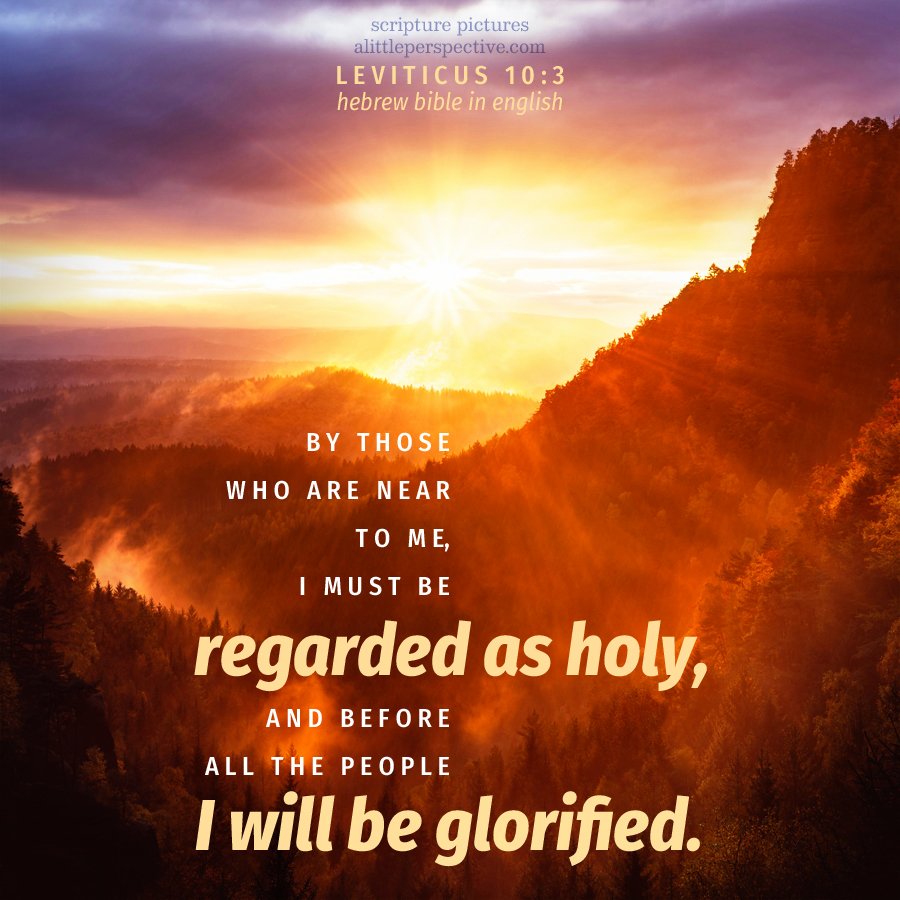Read Leviticus 9 and 10 at Bible Gateway.
Today’s Hebrew paragraph divisions are:
Lev 9:1-10:7 {p} Offerings on the 8th day + Nadab, Abihu consumed
Lev 10:8-11 {p} Intoxication forbidden for priests that they may distinguish + teach holy/ unholy; clean/ unclean
Lev 10:12-20 {p} The two sons who were left did not eat the sin offering in a holy place
Then Nadab and Abihu, the sons of Aaron, each took his censer and put fire in it, put incense on it, and offered profane fire before the LORD, which He had not commanded them. So fire went out from the LORD and devoured them, and they died before the LORD. And Moses said to Aaron, “This is what the LORD spoke, saying: ‘By those who come near Me I must be regarded as holy; and before all the people I must be glorified.’” So Aaron held his peace. Lev 10:1-3
What is profane fire? Why did Nadab and Abihu die? Exo 30:1-10 contains the law of offering incense:
“You shall make an altar to burn incense on; you shall make it of acacia wood. A cubit shall be its length and a cubit its width—it shall be square—and two cubits shall be its height. Its horns shall be of one piece with it. And you shall overlay its top, its sides all around, and its horns with pure gold; and you shall make for it a molding of gold all around. Two gold rings you shall make for it, under the molding on both its sides. You shall place them on its two sides, and they will be holders for the poles with which to bear it. You shall make the poles of acacia wood, and overlay them with gold. And you shall put it before the veil that isbefore the ark of the Testimony, before the mercy seat that is over the Testimony, where I will meet with you. Aaron shall burn on it sweet incense every morning; when he tends the lamps, he shall burn incense on it. And when Aaron lights the lamps at twilight, he shall burn incense on it, a perpetual incense before the LORD throughout your generations. You shall not offer strange incense on it, or a burnt offering, or a grain offering; nor shall you pour a drink offering on it. And Aaron shall make atonement upon its horns once a year with the blood of the sin offering of atonement; once a year he shall make atonement upon it throughout your generations. It is most holy to the LORD.” Exo 30:1-10
The word “strange” in Exo 30:9 and the word “profane” in Lev 10:1 are the same word in Hebrew: Strong’s H2114, זוּר, zuwr, zayin + vav + resh. In the ancient pictographs, the zayin is the mattock, the tool used to work in the fields to cultivate crops, so also to cut, food, nourish. The vav is the tent peg, so to add, secure, hook. The resh is the head of a man, so also first, top, beginning. The cognate words of this root have to do with winnowing grain. The resh in this root is referring to the heads of grain that are gathered to be winnowed. When grain is winnowed, the grain is tossed in the air while there is a slight breeze. The seed falls down into the basket, while the chaff, or the unusable skin that covered the seed, is blown away by the wind. So the chaff is cut off from the secured heads that stayed at home. That scattering of the chaff abroad is the story being told by “strange.” The stranger is the one who comes from abroad, not at home.
So in Exodus, the command was not to offer strange incense on the altar of incense, or different incense than the prescribed incense. Nadab and Abihu offered the proper incense but in censors, not on the altar. Thus, strange fire. This sounds like a case of obeying the letter of the law – they didn’t offer strange incense after all – while transgressing the spirit of the law – they did not worship God in the manner He prescribed.
And it may be, that since the paragraph about intoxication being forbidden for priests immediately follows the Nadab and Abihu incident, that Nadab and Abihu had too much to drink in celebrating their inauguration as priests, and were not thinking clearly. At any rate, you can be sure that Aaron’s sons who were left regarded the LORD God as holy in all their worship and service from that day forward. So you might say the strange fire incident served to consecrate the priesthood from their hearts, in the way that going through the ceremony never could.
The strong themes of Leviticus so far:
Lev 1:1-13 {s+p} The law of the voluntary whole burnt offering of the herd or flock
Lev 1:14-2:16 {sx5+p} The law of the voluntary burnt offering of birds or grain
Lev 3:1-4:35 {px8} The law of the voluntary peace offering and mandatory sin offering
Lev 5:1-16 {s+s+p} The law of the trespass offering when the trespass is unintentional
Lev 5:17-6:7 {p+p} The law of the ram of the trespass offering
Lev 6:8-18 {s+p} The law for the priests of the offerings brought by the people
Lev 6:19-7:38 {px5} The law for the offerings brought by the priests + the priests’ portion
Lev 8:1-10:7 {s+p} Consecration of the tabernacle + priesthood
Lev 10:8-11 {p} Intoxication forbidden for priests that they may distinguish + teach holy/ unholy; clean/ unclean
Lev 10:12-20 {p} The two sons who were left did not eat the sin offering in a holy place

















Leave a Reply